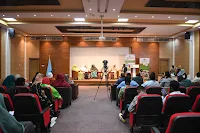The Absence of Genuine Civil Society in Post-Conflict Somalia: A Barrier to Inclusive Political Participation The Role of Civil Society in Political Transitions
In post-conflict societies, civil society plays a pivotal role in shaping governance, promoting accountability, and ensuring that political processes are inclusive. A robust and independent civil society acts as a bridge between the state and its citizens, advocating for marginalized voices and fostering democratic consolidation. However, in Somalia, the landscape of civil society remains fragile, underdeveloped, and, in many cases, co-opted by political and donor interests. This absence of genuine civil society actors presents a significant challenge to the realization of inclusive political participation, particularly for women, youth, and marginalized groups.
Somalia’s governance structures continue to be shaped by deeply entrenched clan dynamics, elite bargaining, and external interventions. While these factors have contributed to short-term stability, they have simultaneously constrained the emergence of an independent and representative civil society capable of advocating for broader political inclusion.
Several key factors have contributed to the underrepresentation of civil society actors in Somalia:
• Political Co-optation and Instrumentalization – Many civil society organizations (CSOs) operate under the influence of political factions, serving as extensions of clan or elite interests rather than as independent voices for the public good. This has weakened their ability to advocate for systemic reforms and hold political actors accountable.
• Security and Operational Challenges – The volatile security environment, including threats from armed groups and political actors, has severely restricted the ability of civil society to operate freely. Activists and organizations that challenge the status quo often face intimidation, harassment, or violence.
• Donor-Driven Agendas – A significant portion of civil society activity in Somalia is shaped by international donor priorities rather than organic grassroots advocacy. While external funding is essential, it has often resulted in short-term, project-based interventions that lack sustainability and fail to address deeper structural issues.
• Limited Civic Space and Legal Protections – The legal and institutional framework governing civil society remains weak, with restrictive policies limiting the ability of CSOs to function independently. The absence of strong legal protections for civil society actors has further hindered their capacity to advocate for inclusive governance.
The Impact on Inclusive Political Participation
• Women’s Political Representation – Despite commitments to gender inclusion, including the 30% quota for women in government, implementation remains inconsistent. The absence of strong civil society advocacy has allowed political actors to circumvent these commitments, resulting in continued underrepresentation of women in governance structures.
• Youth Exclusion from Decision-Making – With over 70% of Somalia’s population under the age of 30, the exclusion of youth from political processes represents a critical governance challenge. Without civil society-driven platforms to amplify youth voices, political spaces remain dominated by older elites, reinforcing generational power imbalances.
• Marginalized Communities and Political Disenfranchisement – Minority clans and marginalized communities have historically been excluded from political power. The lack of independent civil society organizations advocating for their rights has perpetuated systemic inequalities, limiting their access to political representation and decision-making forums.
The absence of a strong civil society not only undermines political inclusion but also poses broader risks to governance and stability in Somalia. Without civil society acting as a watchdog, political processes remain elite-driven, reinforcing patronage networks and weakening public trust in government institutions. Furthermore, the lack of independent advocacy mechanisms reduces accountability, enabling human rights violations, corruption, and the erosion of democratic norms.
Strengthening Civil Society for Democratic Consolidation
To foster a more inclusive and participatory political environment, deliberate efforts must be made to strengthen the role of civil society in Somalia. Key recommendations include:
• Enhancing Legal and Institutional Protections – Establishing clear legal frameworks that safeguard the independence and operational space of civil society organizations is critical for their long-term sustainability.
• Investing in Grassroots-Led Civil Society Initiatives – Donors and development partners should prioritize direct support for locally driven organizations that have legitimacy within communities, rather than favoring elite-controlled or internationally driven initiatives.
• Expanding Civic Education and Political Awareness – Strengthening civic engagement through education programs can empower women, youth, and marginalized groups to participate more actively in political processes.
• Creating Platforms for Multi-Stakeholder Engagement – Encouraging dialogue between civil society, government institutions, and political actors can facilitate greater collaboration and ensure that governance reforms reflect the interests of all segments of society.
Conclusion
The absence of a strong and independent civil society in Somalia represents a major obstacle to inclusive governance and sustainable peace. Without a vibrant civic space advocating for the rights of women, youth, and marginalized communities, political processes will continue to be dominated by narrow elite interests. Strengthening civil society is not merely a democratic imperative—it is a necessary condition for achieving long-term stability and social cohesion in Somalia.



Comments